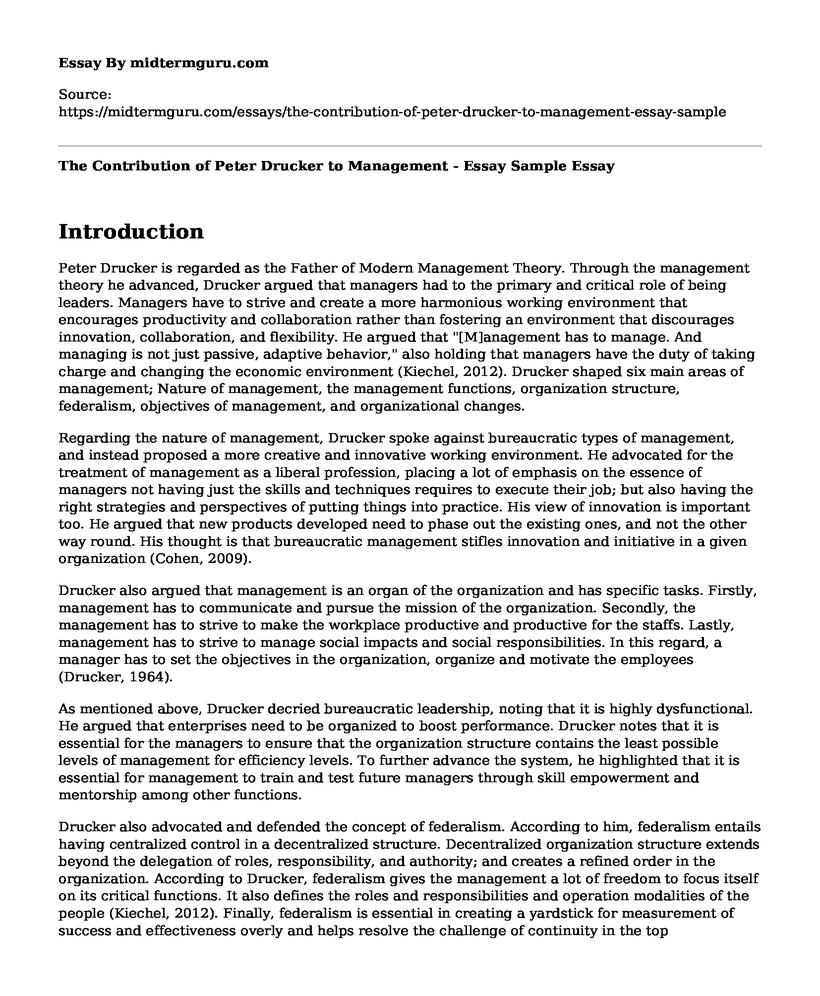Introduction
Peter Drucker is regarded as the Father of Modern Management Theory. Through the management theory he advanced, Drucker argued that managers had to the primary and critical role of being leaders. Managers have to strive and create a more harmonious working environment that encourages productivity and collaboration rather than fostering an environment that discourages innovation, collaboration, and flexibility. He argued that "[M]anagement has to manage. And managing is not just passive, adaptive behavior," also holding that managers have the duty of taking charge and changing the economic environment (Kiechel, 2012). Drucker shaped six main areas of management; Nature of management, the management functions, organization structure, federalism, objectives of management, and organizational changes.
Regarding the nature of management, Drucker spoke against bureaucratic types of management, and instead proposed a more creative and innovative working environment. He advocated for the treatment of management as a liberal profession, placing a lot of emphasis on the essence of managers not having just the skills and techniques requires to execute their job; but also having the right strategies and perspectives of putting things into practice. His view of innovation is important too. He argued that new products developed need to phase out the existing ones, and not the other way round. His thought is that bureaucratic management stifles innovation and initiative in a given organization (Cohen, 2009).
Drucker also argued that management is an organ of the organization and has specific tasks. Firstly, management has to communicate and pursue the mission of the organization. Secondly, the management has to strive to make the workplace productive and productive for the staffs. Lastly, management has to strive to manage social impacts and social responsibilities. In this regard, a manager has to set the objectives in the organization, organize and motivate the employees (Drucker, 1964).
As mentioned above, Drucker decried bureaucratic leadership, noting that it is highly dysfunctional. He argued that enterprises need to be organized to boost performance. Drucker notes that it is essential for the managers to ensure that the organization structure contains the least possible levels of management for efficiency levels. To further advance the system, he highlighted that it is essential for management to train and test future managers through skill empowerment and mentorship among other functions.
Drucker also advocated and defended the concept of federalism. According to him, federalism entails having centralized control in a decentralized structure. Decentralized organization structure extends beyond the delegation of roles, responsibility, and authority; and creates a refined order in the organization. According to Drucker, federalism gives the management a lot of freedom to focus itself on its critical functions. It also defines the roles and responsibilities and operation modalities of the people (Kiechel, 2012). Finally, federalism is essential in creating a yardstick for measurement of success and effectiveness overly and helps resolve the challenge of continuity in the top management.
Conclusion
Management by objectives is one of the most critical contributions of Drucker to management. He argued that management by objectives should not just be regarded as a technique, but more so as a philosophy of management. Finally, Drucker anticipated rapid organizational changes in the society and advised that organizations need to develop dynamism which will enable them to absorb the differences better. Overly, Peter Drucker has contributed immensely to management and shaped how modern managers can effectively and efficiently manage the workplaces with little to no friction.
References
Cohen, W. A. (2009). Drucker on leadership: New lessons from the father of modern management. John Wiley & Sons.
Drucker, P. F. (1964). Managing for results: Economic tasks and risk-taking decisions. New York: Harper & Row.
Kiechel, W. (2012). The management century. Harvard Business Review, 90(11), 62-75.
Cite this page
The Contribution of Peter Drucker to Management - Essay Sample. (2022, Sep 20). Retrieved from https://midtermguru.com/essays/the-contribution-of-peter-drucker-to-management-essay-sample
If you are the original author of this essay and no longer wish to have it published on the midtermguru.com website, please click below to request its removal:
- Affiliative Leadership Style - Management Essay Example
- Ethics and Sustainability Ford Motors Company - Paper Example
- Discussion Questions on Business Administration - Paper Example
- Changing Bad Habits: Single-Subject Design
- Paper Example on LensCrafters' Operations Strategy
- Interview Example on CEO of the Orascom Company
- Leadership Strategies for Change: Achieving Success in an Organizational Transition - Essay Sample







